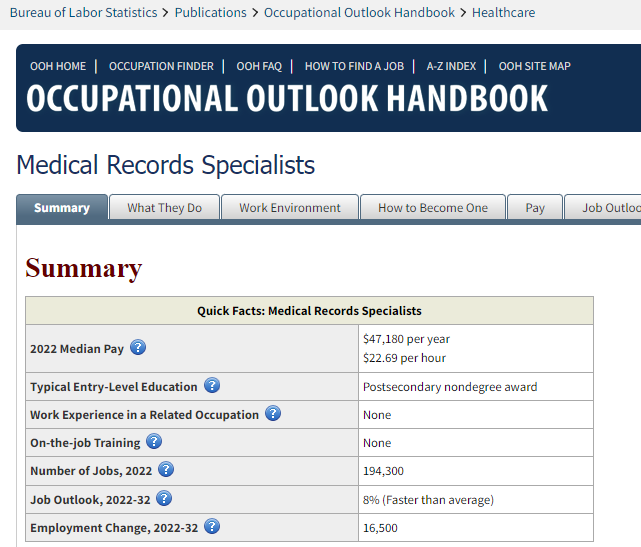Are you interested in making money with medical coding from home? The demand for skilled medical coders continues to grow, and the opportunity to make money from home in this field is more accessible than ever. Medical coding involves translating healthcare procedures, diagnoses, and medical services into standardized codes for insurance claims and medical records. This essential role in the healthcare industry can be performed remotely, providing a flexible and potentially lucrative source of income. In this comprehensive blog post, we will explore how to make money through medical coding from the comfort of your home, the skills and training required, income potential, and essential tips to maximize your earning potential.
Why Choose Home-Based Medical Coding?
Before delving into the practical steps to make money with medical coding from home, it's essential to understand why this career path is an attractive choice:
1. Flexibility: Home-based medical coding offers unparalleled flexibility. You have the freedom to set your own work hours and create a schedule that fits your lifestyle.
2. In-Demand Skill: The healthcare industry is constantly growing, and healthcare providers need accurate coding to process claims and maintain patient records. Skilled medical coders are always in demand.
3. Work-Life Balance: Working from home allows you to achieve a better work-life balance. This flexibility is especially valuable for individuals with family responsibilities or other commitments.
4. Potential for Earnings: While earnings vary, medical coding can offer a stable income, and with experience and specialization, you can increase your earning potential.
Getting Started with Home-Based Medical Coding
To embark on a successful journey in home-based medical coding, you need to follow these essential steps:
1. Understand the Responsibilities of a Medical Coder
It's crucial to have a comprehensive understanding of the role and responsibilities of a medical coder:
- Reviewing medical records to identify procedures, diagnoses, and services.
- Translating medical information into standardized codes.
- Ensuring coding accuracy and compliance with guidelines.
- Collaborating with healthcare providers to clarify information when needed.
2. Develop the Necessary Skills
To excel in home-based medical coding, you need a specific skill set, including:
Attention to Detail: Precise coding is paramount in medical coding, so keen attention to detail is necessary.
Analytical Skills: Coders must analyze complex medical information and convert it into the appropriate codes.
Medical Terminology: A sound understanding of medical terminology is critical. Familiarize yourself with anatomy, physiology, and medical procedures.
Coding Systems Knowledge: Proficiency in coding systems such as ICD-10, CPT, and HCPCS Level II is vital. Staying up-to-date with any changes is essential.
Computer Skills: Most coding work is done on computers, so you must be comfortable with relevant software and technology.
3. Obtain the Necessary Medical Coding Education and Training
Medical coding is a specialized field that requires education and training. Follow these steps:
High School Diploma or Equivalent: Although not always mandatory, many employers prefer candidates with a high school diploma or GED.
Select a Reputable Program: Look for accredited medical coding programs offered by vocational schools, community colleges, or online institutions. These programs can vary in length, ranging from several months to over a year.
Certification: While not always required, certification is highly recommended. Two widely recognized certifications are the Certified Professional Coder (CPC) credential from the American Academy of Professional Coders (AAPC) and the Certified Coding Specialist (CCS) credential from the American Health Information Management Association (AHIMA). Certification demonstrates your expertise and can improve job prospects.
The short-term training is another reason why you may want to consider starting a career in medical billing and coding. And some schools get you ready to graduate and be career-ready in less months and most students complete their training and earn their certification in 8 months or less.
According to CareerStep, 83% of employers encourage or require certification for billing and coding specialists.
You can read my blog post, How to Pass the CPC Exam, to learn more about the CPC exam and certification.
Gain Practical Experience: Securing hands-on experience is crucial. Consider internships or entry-level positions in healthcare facilities to build your coding skills and knowledge.
Continuous Learning: The medical coding field evolves with changes in healthcare regulations and coding systems. Stay up-to-date by attending workshops, seminars, and continuing education programs.
4. Set Up Your Home Office
To work effectively from home, you must establish a suitable home office. Consider the following tips:
- Choose a quiet, dedicated workspace free from distractions.
- Invest in a comfortable chair, desk, and computer with multiple monitors, if possible.
- Ensure you have a reliable high-speed internet connection.
- Acquire necessary equipment, such as current coding books and coding software.
- Pay attention to ergonomics to reduce the risk of repetitive strain injuries.
5. Find Remote Medical Coding Jobs
With the right education, skills, and home office setup, it's time to search for remote medical coding jobs. Here are several avenues to explore:
Online Job Boards: Websites like Indeed, LinkedIn, Glassdoor, and the AAPC's job board frequently list remote medical coding job openings. Use keywords such as “remote medical coder” or “telecommute medical coding” to narrow your search.
Healthcare Staffing Agencies: Some healthcare staffing agencies specialize in connecting medical coders with remote job opportunities. They can help match you with suitable positions.
Hospital and Healthcare System Websites: Check the career pages of hospitals and healthcare systems, both locally and nationally. Many institutions offer remote coding positions.
Professional Organizations: Joining professional organizations like the AAPC or AHIMA can provide networking opportunities and access to job listings.
Freelance Platforms: Some medical coding jobs are available on freelance platforms like Upwork and Freelancer. Keep in mind that freelancing may require managing your taxes and benefits.
6. Prepare for Interviews
When applying for remote medical coding positions, you'll likely go through an interview process. Be ready to discuss your education, certification, and coding experience. Highlight your ability to work independently and meet deadlines. Prepare to take coding tests to demonstrate your skills.
7. Secure Your Remote Position
After successfully completing interviews and tests, you can secure your remote medical coding job. Be sure to review your employment agreement, understand your responsibilities, and clarify any questions regarding work expectations, pay, and benefits.
Maximizing Earnings as a Home-Based Medical Coder
Once you've secured a remote medical coding position, you can take steps to maximize your earnings in this field. Here are strategies to consider:
According to CareerStep, the median salary for most coding and billing specialists is between $40,000 and $66,000 a year. Medical coders can start out earning over $40,000 on average and may also receive employment benefits.

1. Specialize in a Medical Coding Niche
Consider specializing in a specific area of medical coding, such as cardiology, orthopedics, or radiology. Specialization can make you a sought-after expert in your field and often results in higher pay.
2. Pursue Additional Certifications
After obtaining your initial certification, consider pursuing additional certifications related to your chosen specialty. For example, if you're working in cardiology, you might want to earn a Certified Cardiology Coder (CCC) credential. These additional certifications can lead to higher-paying positions.
3. Gain Experience and Expertise
Experience plays a significant role in increasing your earning potential. As you gain more experience in medical coding, your expertise becomes more valuable to employers, and you can command a higher salary.
4. Work with Multiple Clients or Employers
Freelance or contract coding positions can often lead to working with multiple clients or employers simultaneously. This diversification can increase your income, especially if you work with clients who require specialized coding services.
5. Stay Current with Medical Coding Changes
Regularly update your knowledge of coding guidelines and stay informed about changes in the healthcare industry. Staying current can make you more valuable to employers and clients.
6. Negotiate for Higher Pay
When starting a new position or taking on new clients, don't hesitate to negotiate your pay rate. Conduct research to understand the average pay rates for your experience and specialization and use this information to your advantage.
7. Consider Part-Time or Full-Time Medical Coding Positions
Some remote medical coders opt for part-time positions to achieve a work-life balance, while others prefer full-time roles to maximize their income. Consider what works best for your personal and financial goals.
8. Monitor Productivity and Quality
Many employers and clients reward medical coders for both productivity and the quality of their work. Monitor your coding productivity and accuracy to meet or exceed expectations.
9. Understand the Business Side
If you work as a freelance medical coder, consider the business side of your work. Manage your taxes, expenses, and marketing efforts to attract clients and maximize earnings.
Earning Potential in Home-Based Medical Coding
The earning potential for home-based medical coders can vary depending on factors such as experience, specialization, geographic location, and the type of employer or client.
According to CareerStep, the median salary for most coding and billing specialists is between $40,000 and $66,000 a year. Medical coders can start out earning over $40,000 on average and may also receive employment benefits.
According to the Bureau of Labor Statistics (BLS), the median annual wage for medical records and health information technicians, which includes medical coders, was $46,660 in 2021. However, some experienced and specialized coders can earn significantly more.
To provide a clearer picture of potential earnings, here's a breakdown based on experience in 2021:
- Entry-Level Coders: Those just starting in the field typically earn the lower end of the salary spectrum, which can range from $30,000 to $40,000 annually.
- Experienced Coders: Coders with a few years of experience can expect to earn a median salary, which falls within the range of $45,000 to $60,000 per year.
- Specialized Coders: Experienced coders who specialize in high-demand areas, such as anesthesia or cardiology, can command salaries in the range of $60,000 to $80,000 or more annually.
- Consulting and Freelance Coders: Independent coders who work on a freelance or contract basis can set their own rates. Earnings can vary widely, with some experienced consultants earning six-figure incomes.
Remember that salaries can fluctuate based on factors like geographic location, employer, and the current job market. As a remote medical coder, you have the opportunity to tap into these varying income levels based on your qualifications and the demands of your chosen specialty.
Conclusion
Working from home as a medical coder offers not only the flexibility to balance work and life but also the potential for a rewarding income. Whether you're seeking a stable career with a good work-life balance or you aim to maximize your earning potential, medical coding from home can be a satisfying and profitable path.
By following the steps outlined in this guide, you can establish yourself as a home-based medical coder and embark on a journey that leads to a fulfilling and financially rewarding career. Your commitment to education, continuous improvement, and adaptability to changes in the healthcare industry will play a crucial role in your success.
Home-based medical coding offers a world of possibilities, whether you're starting your career, seeking a career change, or looking for a flexible way to make money. It's a dynamic field that allows you to grow your expertise, increase your income, and maintain a work-life balance that suits your lifestyle.
So, take the initiative, invest in your education and training, and seize the opportunities waiting for you in the world of home-based medical coding.

